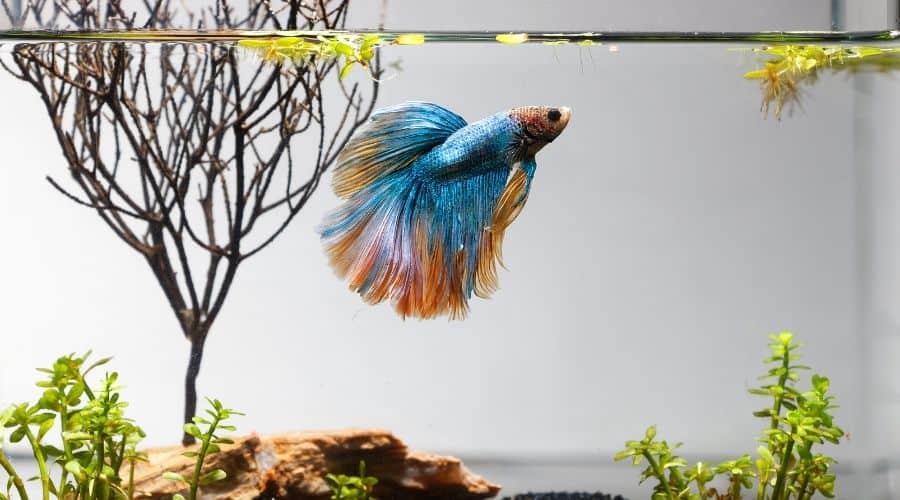Swim bladder disease is common in beta fish but also easy to treat. One of the first signs is often that the fish isn’t swimming around as it should.
An overfed beta is likely to get constipated, which leads to this alarming issue. However, there are other potential culprits for unmoving fish. Why is your betta fish staying in one spot?
The main reason why a Betta fish stays in one spot is because it has swim bladder disease due to overfeeding or poor water quality. You can help prevent swim bladder disease by only feeding your fish the appropriate amount of food to avoid overeating and making sure their water is clean and not too cold that they go into shock.
Table of Contents
Why Do Betta Fish Stay In One Spot
It is common for a betta with swim bladder disease to stay in one spot. One of the most common signs of this uncomfortable problem is that the fish may be floating upside down at the bottom of its tank, though they don’t always turn over.
Regrettably, swim bladder disease is typical for betta fish, but it’s usually not fatal.
One of the best ways to prevent swim bladder disease is to watch how much you feed your pet. This problem is often a blockage from overeating that causes constipation.
However, fish can also get swim bladder disease from water that’s too cold, shock, parasites, and bacterial infections.
Below I’ve listed some of the other reasons a betta might generally stay in one spot.
Is It Normal For A Betta Fish To Stay In One Spot
1 – Sleeping Fish
It is normal for a betta fish to stay in one spot while it is sleeping. Since this is a widespread, daily occurrence, there’s no need to worry over a sleeping fish.
Betta fish usually sleep 12 to 14 hours per day, and they don’t just sleep all at once overnight but also take naps.
If the lights are low or off, your fish may think it’s nighttime and doze off, so turning on a bright light nearby may wake them. Fortunately, spotting a sleeping betta is relatively easy.
According to Betta Care Fish Guide, “You can tell if your betta is sleeping by looking at his mouth and gills. As long as they’re still moving in rhythm, then there’s nothing to worry about. Bettas can sleep in so many different positions, including on their sides, at the bottom of the tank, and on leaves.”
2 – Water Problems
It is also normal for a betta to become much less active if their tank water is bad or set up wrong for them. Sadly, not all tank pollution is easy to see.
Many new betta owners think those cute, tiny display bowls are all their pet needs, but these are not enough space to swim, and they don’t have much circulation to keep the water aerated.
Your betta needs a five-gallon tank all to himself. Ammonia buildup is easy to avoid with regular cleanings, but you will still need a low-flow water pump.
Additionally, you need to keep your fish tank between 76 and 80 degrees Fahrenheit.
3 – Parenting Is Tough
Is your betta fish female? If so, it’s normal for her to stay in one spot more often when she’s about to lay eggs.
Being gravid takes a lot of energy, so using less to swim around is normal. It’s typically pretty easy to spot a pregnant fish because her belly will bulge out.
I recommend this video from Creative Pet Keeping if you want to know more about spotting pregnant bettas.
The good thing about this answer is that it won’t last long since your fish will only carry eggs in her ovipositor for one to two weeks.
However, once she lays the eggs, they’ll hatch into fry within three days. You could have as many as forty baby bettas on your hands.
Why Is My Male Betta Staying In One Spot
Your male betta may be staying in one spot because he is stressed out. Sadly, stress is a common problem for these colorful fish. Diseases, too strong filter currents, poor nutrition, and even boredom can cause this to occur.
Below are the other symptoms of stress in male betta fish, so you know what to look for.
- Clamped fins that are held tight against the body
- Darting around nervously.
- Fading colors that don’t look as vibrant as when you first got the fish
- Hiding constantly in features or behind the filter shows the fish is worried or afraid.
- Another clue is a low appetite or ignoring food when the fish doesn’t have signs of swim bladder disease.
- Stress stripes are less common and harder to see on male bettas, but they may be visible.
Betta Staying At Top Of Tank Not Eating
Hopefully, I’m not the first one to tell you that a fish that is floating, especially upside down, at the top of its tank could be dead.
Sadly, dead fish no longer need food. Check that its gills are moving and do a smell test to ensure your fish is indeed alive when you see a betta staying at the top of the tank not eating.
More likely, your pet is just getting some fresh air. Some varieties of fish, like bettas and gourami’s, are actually supposed to breathe air from the surface.
Helpful Tips To Know About Betta Fish Staying In One Spot
Sometimes betta fish stay in one spot because they’re having a lovely nap. However, there are plenty of problems that can also cause them to stop moving around normally.
Here are more helpful tips to know about betta fish staying in one spot.
- The easiest way to prevent your betta fish from staying in one spot for the wrong reasons is to keep their tank clean and ensure that you feed them the right amounts of healthy food.
- A typical healthy betta fish is brightly colored, moves around smoothly, and feeds easily. You can also look at their fins for signs of normal behavior. A happy betta will hold its fins out loosely and let them flow.
- Keeping your betta happy and active requires effort. To prevent lethargy and avoid having your fish hover alarmingly in one spot, provide them with lots of decorations to interact with. You can even teach a betta to do tricks like jumping on command.
Final Thoughts
So long as it isn’t upside down at the top of the tank, your non-moving beta is probably going to be just fine. People often mistake sleeping fish for a problem, which is sweet and shows care, but also isn’t worth worrying over.
Swim bladder disease on the other hand is serious, and best avoided whenever possible. Don’t overfeed your fish and ensure that it has a proper habitat.
A tank with lost of room to swim and some places to hide will help your betta stay healthy. Plus, it’s less likely to try and hide in a corner without moving when it has places to feel safe.
Whatever the reason your betta fish is staying in one spot, you can figure it out quickly, and take steps to help them, unless they’re sleeping, in which case, let them sleep.

